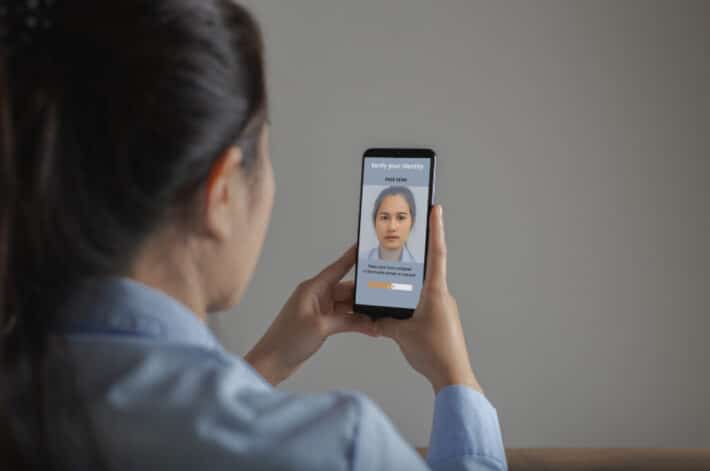Top Trends Shaping the Future of Identity Verification

Identity verification is a crucial process in today’s digital world to confirm the identity of individuals. The rise in fraud and identity theft has increased the need for secure verification methods. Challenges such as inconvenient processes and lack of universal standards hinder the efficiency of these systems. Emerging trends like biometric verification, artificial intelligence, and blockchain technology are revolutionizing identity verification, offering enhanced security and user experience.
However, concerns about privacy and biases must be addressed as these trends shape the future of identity verification. Regulations and standards will play a key role in ensuring the security and fairness of these systems. Explore the top trends shaping the future of identity verification and the potential concerns that come with them.
What is Identity Verification?
Identity Verification is the process of confirming a person’s identity through various methods to ensure they are who they claim to be. This verification process holds immense significance in maintaining security and preventing fraud in numerous sectors. By accurately verifying an individual’s identity, organizations can establish trust and credibility in online transactions, streamline customer onboarding processes, and enhance secure access control to sensitive information and physical locations.
Common methods utilized for identity verification include biometric authentication, leveraging unique biological traits like fingerprints or facial recognition, and document verification, which involves verifying official identification documents to validate identity claims.
Why is Identity Verification Important?
Identity Verification plays a crucial role in ensuring secure transactions, preventing fraud, and safeguarding sensitive data. By effectively verifying the identity of individuals, businesses can establish a level of trust that is essential in today’s digital landscape. This verification process not only protects user data but also ensures compliance with regulatory standards, mitigating the risks of financial crime and identity theft.
Through the use of advanced authentication methods, such as biometrics and two-factor authentication, identity verification contributes significantly to fraud prevention and enhances cybersecurity measures. Ultimately, maintaining a secure digital environment through robust identity verification practices is vital for both businesses and individuals seeking to protect themselves from potential security breaches and fraudulent activities.
What are the Current Challenges with Identity Verification?
Despite its importance, Identity Verification faces several challenges, including increasing fraud and identity theft, inconvenient processes, and the lack of universal standards and regulations. Identity verification processes are essential for businesses to ensure the security of their operations and data. The rise of sophisticated fraud tactics has made it increasingly difficult to authenticate individuals accurately. This not only puts businesses at risk of financial losses but also damages their reputation and customer trust.
The time-consuming nature of traditional verification methods can lead to customer frustration and abandonment of the onboarding process, resulting in potential revenue loss. The absence of standardized practices further complicates the situation, making it challenging for businesses to comply with regulatory requirements and protect user data effectively.
Increasing Fraud and Identity Theft
One of the significant challenges in Identity Verification is the growing threat of fraud and identity theft, highlighting the need for robust verification solutions to combat malicious activities. Such fraudulent activities not only jeopardize the security and privacy of individuals but also pose substantial financial risks to businesses globally. The impact of fraud can resonate across various sectors, leading to loss of customer trust, tarnished reputation, and legal implications.
For instance, in 2020, the Federal Trade Commission reported over 1.3 million cases of identity theft in the United States alone. To address these alarming trends, businesses are increasingly turning to advanced verification methods like biometric authentication and AI-driven solutions to fortify their defenses and safeguard sensitive information.
Inconvenient and Time-consuming Processes
The inconvenience and time consumption associated with traditional Identity Verification processes pose a challenge for users, prompting the need for streamlined methods that enhance user experience and security. Cumbersome verification procedures not only lead to frustration among users but also impact conversion rates negatively. Simplifying the verification process through multi-factor authentication and mobile verification can significantly improve user satisfaction.
By offering a seamless verification experience, businesses can enhance customer onboarding, leading to higher retention rates. User-centric verification solutions prioritize both security and user experience, creating a win-win situation for businesses and their customers.
Lack of Universal Standards and Regulations
The absence of universal standards and regulations in Identity Verification creates a fragmented landscape, hindering consistency and trust in verification processes. This lack of standardized practices poses significant challenges for organizations across various industries. Without clear guidelines, businesses may struggle to verify the identities of their customers accurately, leaving room for errors and potential fraud.
In today’s digital age, where data privacy concerns are at an all-time high, compliance with data protection laws and industry regulations is paramount. The absence of a cohesive regulatory framework not only hampers the reliability of identity verification but also puts sensitive information at risk. Establishing harmonized standards can help streamline verification processes and enhance security measures to combat identity theft and unauthorized access.
What are the Emerging Trends in Identity Verification?
The landscape of Identity Verification is evolving rapidly, driven by emerging trends such as Biometric Verification, Artificial Intelligence, Blockchain Technology, and Mobile-based Verification.
-
Biometric verification methods, which use unique biological features such as fingerprints, facial recognition, and iris scans, have been gaining popularity due to their accuracy and reliability in confirming individual identities.
-
The integration of AI in verification processes has enabled more sophisticated fraud detection techniques, enhancing overall security measures.
-
The utilization of blockchain technology ensures secure and transparent storage of identity data, reducing the risk of data breaches and identity theft.
-
The shift towards mobile-centric verification methods not only offers convenience but also strengthens authentication practices by leveraging the ubiquity and personal nature of smartphones.
Biometric Verification
Biometric Verification is a cutting-edge approach that utilizes unique biological traits such as fingerprints or facial features for secure authentication and identity validation. These biometric systems offer unparalleled accuracy in identifying individuals, as each person’s biometric data is distinct and cannot be easily replicated. The convenience of biometric verification cannot be overstated, as users no longer need to remember complex passwords or carry physical identification cards.
The enhanced security provided by biometrics helps safeguard sensitive information and assets from breaches and unauthorized access. In industries such as banking, healthcare, and government, biometric authentication plays a crucial role in preventing identity fraud and ensuring only authorized individuals have access to critical data and services.
Artificial Intelligence and Machine Learning
Artificial Intelligence and Machine Learning are revolutionizing Identity Verification processes by enabling AI-powered verification solutions that enhance accuracy, speed, and fraud detection capabilities. These advanced technologies not only streamline the verification process but also offer adaptive security features that can continuously learn and adapt to new fraud patterns.
By leveraging machine learning algorithms, AI-driven verification systems are able to provide real-time authentication, ensuring that users are accurately identified during transactions. The ability of AI to detect suspicious activities in a fraction of a second is a game-changer in the fight against identity theft and fraud. The benefits of AI-driven verification extend to improving operational efficiency by reducing manual efforts and enhancing customer experience through faster and more reliable verification processes.
Blockchain Technology
Blockchain Technology offers a decentralized and secure framework for managing digital identities and ensuring tamper-proof records, revolutionizing identity management and secure transactions. The applications of blockchain in identity verification extend beyond just providing a secure environment for managing identities. By utilizing blockchain technology, individuals can undergo identity proofing processes with enhanced privacy and security.
Blockchain enables compliance with stringent data protection laws, ensuring that sensitive information is securely stored and accessed only by authorized parties. The transparency and immutability of blockchain enhance trust in identity verification processes, establishing a reliable and efficient mechanism for verifying and validating digital identities.
Mobile-based Verification
Mobile-based Verification leverages the ubiquity of smartphones to enable seamless and convenient identity verification processes, driving digital transformation and enhancing online identity verification. Mobile verification not only provides a secure and efficient way for users to prove their identity but also simplifies remote verification processes. With the increasing reliance on digital platforms, the role of mobile devices in identity verification has become crucial in various industries such as finance, healthcare, and e-commerce.
Mobile verification allows for smooth onboarding experiences for new users, reducing fraud risks and enhancing trust between businesses and customers. The convenience of verifying identities through mobile devices ensures quick and hassle-free interactions, making it a preferred method for many online services.
Remote Identity Verification
Remote Identity Verification enables users to verify their identity remotely, addressing geographical barriers and enhancing accessibility while posing challenges related to fraud prevention and identity validation. Maintaining the integrity of the verification process is crucial for organizations to instill trust and confidence in their remote verification methods. Robust fraud detection mechanisms play a vital role in safeguarding against fraudulent activities that could compromise the security of sensitive information.
Compliance standards serve as benchmarks to ensure that identity verification processes adhere to legal and regulatory requirements, thereby mitigating risks associated with non-compliance. Secure authentication solutions, such as multi-factor authentication and biometric verification, offer additional layers of security to authenticate user identities accurately and reliably during remote verification processes.
How are These Trends Shaping the Future of Identity Verification?
The emerging trends in Identity Verification are reshaping the future landscape by enhancing security measures, optimizing user experience, and driving digital transformation in identity management.
- Biometric verification, with its unique physical characteristics like fingerprints or facial recognition, offers a highly secure method of authenticating users.
- AI-driven solutions, on the other hand, enable real-time analysis of vast amounts of data to detect suspicious patterns and prevent fraudulent activities.
- Integrating blockchain technology ensures tamper-proof records and enhances data security.
- Mobile verification, leveraging the ubiquity of smartphones, provides convenient and efficient authentication methods for users on-the-go, revolutionizing the overall authentication experience.
Enhanced Security and Fraud Prevention
The adoption of advanced technologies like biometric verification and AI-driven solutions is enhancing security measures and strengthening fraud prevention capabilities in identity verification processes. These cutting-edge technologies have enabled the implementation of real-time fraud detection mechanisms, allowing for instant identification of suspicious activities during the verification process. Adaptive authentication methods, supported by AI algorithms, continuously evaluate the risk levels associated with each verification attempt.
This dynamic approach ensures that security protocols adapt in real-time to the evolving tactics of fraudsters, significantly reducing the likelihood of successful fraudulent activities. By leveraging these innovative tools, organizations can effectively enhance their fraud prevention strategies and mitigate risks associated with identity theft and unauthorized access.
Improved User Experience and Convenience
The integration of user-centric design and seamless verification processes is enhancing user experience, streamlining authentication procedures, and optimizing the onboarding journey for individuals and businesses. By prioritizing user experience in identity verification, businesses can offer personalized verification methods tailored to the specific needs and preferences of their customers. This not only increases the efficiency of the verification process but also helps in building trust and loyalty.
Identity verification services play a crucial role in enhancing customer satisfaction by providing secure and convenient verification solutions. The implementation of user-friendly authentication solutions not only improves conversion rates by reducing drop-off rates during the onboarding process but also fosters brand loyalty by delivering a positive and frictionless customer experience.
Increased Efficiency and Cost Savings
The automation and optimization of identity verification processes are driving efficiency gains and cost savings for businesses, reducing manual errors and enhancing operational effectiveness. By leveraging AI algorithms and digital solutions, organizations are able to streamline identity verification workflows, cutting down processing times significantly.
This not only ensures faster onboarding processes but also minimizes operational costs. The advantages of such efficient verification mechanisms extend beyond just speed and cost-effectiveness. With scalable systems in place, businesses can easily handle increasing verification demands without compromising accuracy or relying heavily on additional resources. This optimization leads to a more agile and reliable verification process, boosting overall operational efficiency.
What are the Potential Concerns with These Trends?
While the advancements in identity verification technologies offer numerous benefits, they also raise concerns regarding privacy, biases in algorithms, and potential discrimination in verification processes. Maintaining ethical standards in biometric verification, AI-driven solutions, and remote authentication methods is crucial for safeguarding individuals’ personal information. In the era of rapid technological growth, ensuring data privacy becomes increasingly challenging due to the vast amount of sensitive information being collected and stored by these systems.
Algorithmic biases pose a significant threat, as they can lead to unjust treatment based on factors like race or gender. Therefore, emphasis must be placed on implementing fair and transparent practices to ensure that verification processes are unbiased and respect individuals’ rights.
Privacy and Data Protection
Privacy and data protection are paramount concerns in identity verification, necessitating secure data management practices, adherence to compliance regulations, and transparency in information handling. When it comes to safeguarding sensitive information during identity verification processes, companies must prioritize data privacy to establish trust with their users.
Implementing robust encryption protocols and secure data handling mechanisms not only ensures compliance with regulations like GDPR but also fosters a sense of security and confidence among customers. Data breaches can have severe repercussions, leading to erosion of user trust and reputation damage for businesses. Therefore, it becomes imperative for organizations to invest in advanced security measures and stay abreast of evolving privacy norms to prevent unauthorized access and data leaks.
Biases and Discrimination
Biases and discrimination in identity verification systems can lead to unfair outcomes, emphasizing the need for algorithmic transparency, bias mitigation strategies, and inclusive verification practices. These risks highlight the importance of ensuring that AI-based verification systems are built on principles of algorithmic fairness and devoid of discriminatory tendencies. One key factor that can contribute to biased decisions is the lack of diversity in training data, which can perpetuate existing societal biases.
It is crucial to have representation from various demographics in the data used to train these systems to achieve equitable verification outcomes. Organizations must actively address biases by implementing measures such as regular audits, diverse team perspectives, and continuous monitoring of system decisions. By promoting inclusivity and considering diverse perspectives in the development and deployment of AI verification systems, we can work towards fostering a more equitable and trustworthy digital future for all individuals.
What is the Role of Regulations and Standards in the Future of Identity Verification?
Regulations and standards play a pivotal role in shaping the future of identity verification, providing a framework for secure and compliant verification processes across industries and geographies.
Compliance with data protection laws, KYC regulations, and industry standards is crucial in ensuring that individuals’ identities are verified accurately and securely. Regulatory bodies have a significant influence in setting up these best practices, guiding organizations towards establishing robust identity verification solutions.
By adhering to regulatory frameworks, companies can not only enhance their security measures but also build trust among their customers through reliable identity verification processes. This alignment with regulatory requirements not only safeguards sensitive data but also aids in preventing identity theft and fraud, making it imperative for businesses to stay updated with evolving regulations.
Frequently Asked Questions
What are the top trends shaping the future of identity verification?
The top trends currently shaping the future of identity verification include biometric technology, blockchain integration, artificial intelligence, machine learning, mobile verification, and decentralized identity.
How is biometric technology changing the landscape of identity verification?
Biometric technology, such as facial recognition and fingerprint scanning, is making identity verification more secure and convenient. It uses unique physical characteristics to verify a person’s identity, reducing the risk of fraud and identity theft.
Why is blockchain integration important for identity verification?
Blockchain technology offers a decentralized and immutable way to store and verify identity information, making it difficult for hackers to manipulate or steal. It also allows for more efficient and secure data sharing between organizations.
How is artificial intelligence improving the accuracy of identity verification?
With the use of AI, identity verification systems can analyze vast amounts of data and learn from patterns to identify potential fraud attempts. This helps to reduce false positives and streamline the verification process.
What role does machine learning play in the future of identity verification?
Machine learning algorithms can adapt and improve over time, making them valuable for identity verification. They can analyze patterns and behaviors to detect suspicious activity and flag it for further verification.
How is mobile verification emerging as a top trend in identity verification?
As more people rely on mobile devices, businesses are turning to mobile verification methods, such as SMS codes or biometric authentication, to verify a person’s identity. This allows for a seamless and secure verification process.




